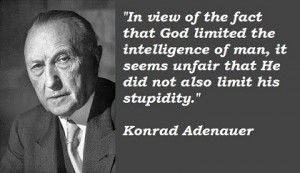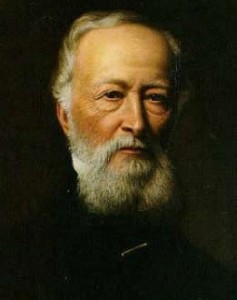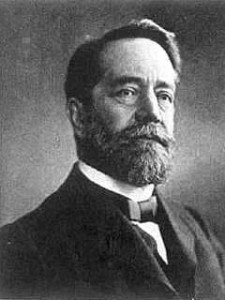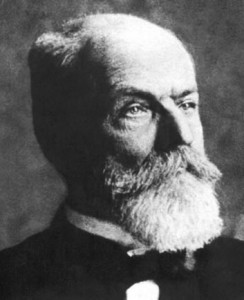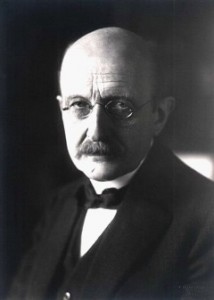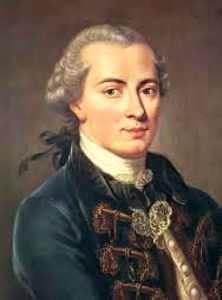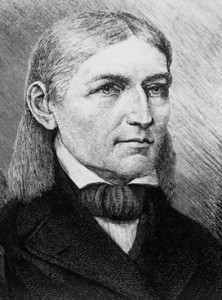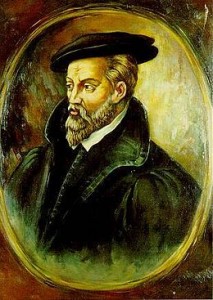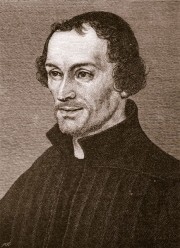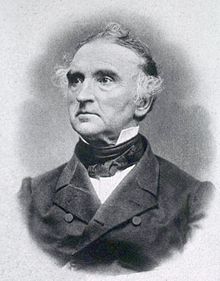At the end of World War II, Germany was a defeated nation occupied by foreign powers. It had lost its national sovereignty, and the world saw it as a pariah, guilty of crimes without parallel in history. In addition to rebuilding their shattered country in a physical sense, most leading German politicians saw their main goals in the coming decades … [Read more...]
April 26 in German History
April 26, 1774 Birth of Leopold Freiherr von Buch in Angermünde, Germany. Buch's travels and reports were instrumental in the development of the study of geography in the 19th century. He studied at the Freiberg School of Mining. For a short time he was the inspector of mines, but soon turned full time to his researches in geology. April 26, … [Read more...]
April 25 in German History
April 25, 1849 Birth of Felix Klein (1849-1925) in Düsseldorf, Germany. Klein was a German mathematician, known for his work in group theory, complex analysis, non-Euclidean geometry, and on the connections between geometry and group theory. His 1872 Erlangen Program, classifying geometries by their underlying symmetry groups, was a hugely … [Read more...]
April 24 in German History
April 24 Feast Day of St. Marianus von Regensburg Marianus (? - 1083) was born in Ireland. He left his home on a Pilgrimage to Rome but only got as far as Germany. He became a Benedictine monk in Bamberg. He then moved to Regensburg where he founded the Monastery of St. Peter and became the Abbot. April 24, 1662 Death of St. Markus Roy … [Read more...]
April 23 in German History
April 23, 1500 Birth of Johannes Stumpf in Bruchsal, Germany. Stumpf was one of the leading Swiss chroniclers of his age. His Gemeiner loblicher Eydgnoschafft Stetten, Landen und Völckeren chronikwirdiger Thaaten Beschreybung of 1547 to 1548 gives detailed information on that period in Switzerland. April 23, 1708 Birth of Friedrich von … [Read more...]
April 22 in German History
April 22, 1724 Birth of Immanuel Kant (1724-1804) in Königsberg, Germany (now in Russia). Kant would become one of the most influential philosophers of all times. His Critiques are the best known of his works, Kritik der reinen Vernunft, Kritik der Praktischen Vernunft. In ethics Kant is known for his categorical imperative. April 22, … [Read more...]
April 21 in German History
April 21, 1488 Birth of Ulrich von Hutten near Fulda. Von Hutten was a staunch supporter of Martin Luther both with his pen as a satirist and with his sword as a knight. In 1522 when German knights rose up against the princes, von Hutten fought with the band of Franz von Sickingen. C. F. Meyer immortalized him in his novel Huttens letzte Tage … [Read more...]
April 20 in German History
April 20, 1494 Birth of Johann Agricola (1494-1566) (original name: Johann Schneider) in Eisleben, Germany (He was a friend and supporter of Martin Luther). Agricola became a strong proponent of the concept that Christian grace replaces the Ten Commandments, which would no longer, then, have force. These views led to a cooling of relations … [Read more...]
April 19 in German History
April 19, 1560 Death of Philipp Melanchthon (1497-1560) (Philipp Schwartzerd) in Wittenberg, Germany. Melanchthon was a friend and enthusiastic supporter of Martin Luther. In 1518 he was appointed at the University of Wittenberg as its first professor of Greek. In 1521 he published Loci communes, a systematic treatment of evangelical … [Read more...]
April 18 in German History
April 18, 1679 Death of Christian Hofmann von Hofmannswaldau in Breslau, Silesia (now Poland). Hofmannswaldau was one of the leading poets of the Baroque period in German literature. April 18, 1819 Birth of Franz von Suppe in Spalato, Austrian Empire (now in Croatia). Suppe was a conductor and composer of comic operas in Vienna. Among his … [Read more...]
- « Previous Page
- 1
- …
- 102
- 103
- 104
- 105
- 106
- …
- 139
- Next Page »
